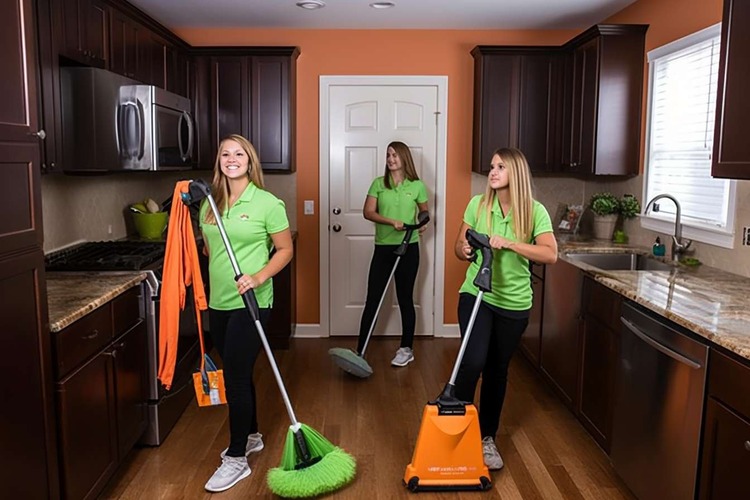Exploring Careers in the Professional Cleaning Sector
Discover the diverse world of professional cleaning, a field offering stability, flexibility, and growth potential. From residential services to specialized industrial roles, this comprehensive guide explores the myriad opportunities within the cleaning industry. Learn about required skills, job types, and potential career trajectories in this essential sector that keeps our environments safe and hygienic.

The professional cleaning industry encompasses a wide array of roles, each contributing to the cleanliness and hygiene of various environments. Let’s delve into some key positions within this sector:
Business Facility Custodians: These professionals maintain cleanliness in corporate offices, educational institutions, healthcare facilities, and other public spaces. Their responsibilities typically include waste management, floor maintenance, and restroom sanitation.
Manufacturing Plant Sanitizers: Specialists in this field work within factories, storage facilities, and production sites, often tackling heavy-duty cleaning tasks and occasionally handling potentially hazardous substances.
Hospitality Cleaning Staff: These individuals are tasked with maintaining guest accommodations and shared spaces in hotels, resorts, and similar lodging establishments.
Niche Cleaning Experts: This category encompasses professionals such as carpet cleaning technicians, glass surface specialists, and high-pressure washing operators who focus on specific cleaning disciplines.
Essential Attributes for Success in Cleaning Professions
Thriving in the cleaning industry requires a blend of practical abilities and personal characteristics:
-
Meticulous Attention: The capacity to clean thoroughly and identify areas requiring extra care is fundamental.
-
Physical Resilience: Cleaning often demands extended periods of standing, bending, and lifting.
-
Efficient Time Usage: Completing tasks within designated timeframes is crucial, particularly in commercial environments.
-
Interpersonal Aptitude: Roles involving client or resident interaction necessitate strong communication skills and a professional demeanor.
-
Cleaning Expertise: A solid understanding of cleaning agents, equipment, and methodologies ensures effective and safe practices.
-
Dependability: Many cleaning positions require access to private areas, making trustworthiness an essential trait.
Initiating a Career in Professional Cleaning
Entering the cleaning industry is relatively accessible, with multiple entry points available:
-
Beginner Positions: Numerous cleaning companies offer on-the-job training for individuals with limited experience.
-
Trainee Programs: Some larger firms or unions provide apprenticeships combining practical experience with formal instruction.
-
Technical Education: Community colleges or trade schools may offer courses in janitorial services or commercial cleaning.
-
Professional Certifications: Organizations such as the International Sanitary Supply Association (ISSA) offer certifications that can enhance employment prospects and industry knowledge.
-
Entrepreneurship: Individuals can launch their own cleaning services with minimal initial investment.
Typical Responsibilities in Cleaning Roles
While specific duties vary based on the setting and specialization, common tasks include:
- Carpet and rug vacuuming
- Hard surface sweeping and mopping
- Furniture and surface dusting
- Bathroom cleaning and disinfection
- Waste bin emptying and liner replacement
- Window and mirror cleaning
- Restocking of hygiene supplies
- Operation of specialized cleaning equipment
Specialized roles may involve additional tasks such as carpet shampooing, exterior pressure washing, or managing hazardous waste in industrial contexts.
Career Advancement in the Cleaning Sector
The cleaning industry offers various pathways for professional growth:
-
Team Leadership: Experienced cleaners can progress to supervisory roles, overseeing staff and managing schedules.
-
Facility Management: With additional education or experience, cleaners can advance to positions managing entire facilities.
-
Specialization: Developing expertise in niche areas like carpet restoration or hazardous material handling can lead to higher-paying positions.
-
Business Ownership: Many successful cleaning professionals establish their own companies, serving residential or commercial clients.
-
Industry Education: Experienced cleaners may transition into training or consulting roles, sharing their expertise with others in the field.
It’s important to note that while the cleaning industry offers numerous opportunities, specific job availability and salary ranges can vary significantly based on factors such as location, experience, and economic conditions. Individuals interested in pursuing a career in this field should conduct thorough research and seek current, localized information to make informed decisions about their career paths.
The cleaning sector provides stable employment prospects with potential for advancement. From entry-level positions to management roles and entrepreneurship, cleaning jobs offer a clear career trajectory for those committed to hard work and skill development. As the emphasis on cleanliness and sanitation continues to grow across various settings, the demand for skilled cleaning professionals is likely to remain robust, making it a viable long-term career option for many individuals.






